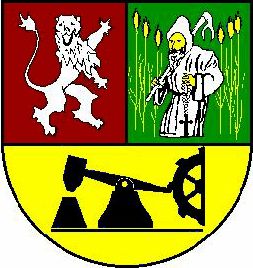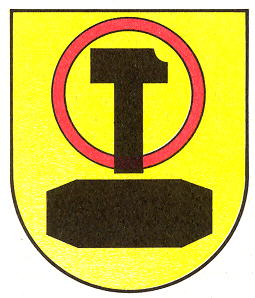Lauchhammer
This page is part of the German heraldry portal |
Heraldry of the World |
|
German heraldry:
|
Selected collector's items from Germany:
|
LAUCHHAMMER
State : Brandenburg
District (Kreis) : Oberspreewald-Lausitz
Additions : 1974 Kleinleipisch; 1993 Grünewalde, Kostebrau
Official blazon
(de) In einem geteilten und oben gespaltenen Schild vorn in Rot einen links-gewendeten, hersehenden silbernen Löwen (Leopard), hinten in Grün einen wachsenden natürlichen Eremiten in silberner Kutte, in der Linken einen goldenen Rosenkranz, in der Rechten eine silberne Grabhacke mit natürlichem Stil haltend, begleitet beiderseits von drei goldenen Ähren. Im unteren goldenen Feld befindet sich ein schwarzes Hammerwerk.
Origin/meaning
The arms were adopted on June 3, 1992 with a golden crown. Only on October 24, 2001 the arms were officially granted, but without the crown.
The lion in the first quarter is taken form the arms of the Lords von Löwendal. The man in the second field is a colonist and is a canting element for the Counts of Einsiedel (Einsiedeln is colonising), who owned the village in the late 18th century and who started the industrialisation of the area. The wheat-ears symbolise the agriculture. The lower half shows an iron-hammer (German: Pochwerk) , used to grind the iron ore. It symbolises the steel industry.
The previous arms were granted in 1953.
These arms show a hammer and briquette, symbolising the industry in the city. The red circle symbolises the concentration of workers in the former Red County (Roten Ländchen). The colours were also the coulours of the GDR.
Contact and Support
Partners:
Your logo here ?
Contact us
© since 1995, Heraldry of the World, Ralf Hartemink 
Index of the site
Literature : Bensing et al; 1984













